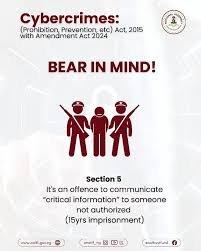FOREIGN DIPLOMATS CALL FOR REFORM OF NIGERIA’S CYBERCRIMES ACT

The heads of mission from the United States, United Kingdom, Finland, Norway, and Canada have jointly called for the reform of Nigeria’s Cybercrimes Act to protect free speech and promote economic growth. In a statement signed by Richard M. Mills, Jr., US Ambassador to Nigeria, and his counterparts from the other countries, they expressed concerns about the misuse of the Act to silence criticism and dissent.

US Ambassador Richard M. Mills, Jr. and his counterparts noted that while the Act aims to combat online fraud and cyberattacks, its broad language and vague definitions leave room for confusion and potential abuse. “The law’s broad scope allows it to be misused against Nigerian citizens seeking to express dissent, form opinions, or criticize powerful people,” they said. Mills and his counterparts welcomed the commitment from Nigeria’s Minister of Information and National Orientation, Mohammed Idris, to review the Act.

The diplomats cited the case of Dele Farotimi, who was charged with 12 counts of cybercrime after reporting alleged corruption in the judiciary. Farotimi’s ordeal highlights the potential for the Act to be misused as a tool to stifle free expression and undermine democratic engagement. Mills emphasized that reform is needed to protect both citizens’ rights and Nigeria’s future.

The diplomats encouraged Nigerian lawmakers to narrow the definitions of key terms such as “false information,” “cyberstalking,” “insult,” “hatred,” and “harassment” to prevent the Act from being used to silence critics and censor expression. “As friends of Nigeria who share the country’s strong commitment to democratic values, we want Nigeria to realize its potential as a democratic digital powerhouse,” Mills said.
The Council of Europe’s Global Action on Cybercrime project is providing funding and technical assistance to support the review of the Act. However, the deadline for the review has been delayed, and the diplomats urged Nigerian lawmakers to prioritize the review and ensure it is open to public consultation and debate [1].





















































































































































































































































































































































































































































































































































































































































































































































































































































































































































































































































































































































































































































































































































































































































































































































































































































































































































































































































































